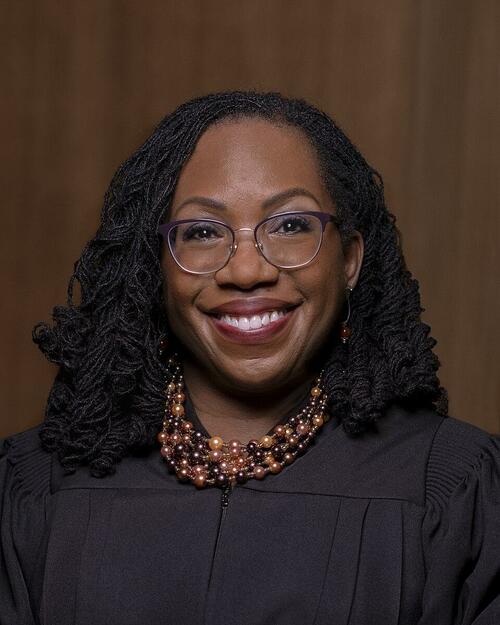I wrote recently about the chilling jurisprudence of Justice Ketanji Brown Jackson, who has drawn the ire of colleagues in opinions for her rhetoric and extreme positions.
Many have expressed alarm over her adherence to what has been described by a colleague as an “imperial judiciary” model of jurisprudence. Now, it appears that Jackson’s increasingly controversial opinions are serving a certain cathartic purpose for the far-left Biden appointee.
On ABC News, Jackson stated, “I just feel that I have a wonderful opportunity to tell people in my opinions how I feel about the issues, and that’s what I try to do.”
Her colleagues have not entirely welcomed that sense of license.
The histrionic and hyperbolic rhetoric has increased in Jackson’s opinions, which at times portray her colleagues as abandoning not just the Constitution but democracy itself.
Her dissent in the recent ruling on universal injunctions drew the rebuke of Justice Amy Coney Barrett over what was described as “a vision of the judicial role that would make even the most ardent defender of judicial supremacy blush.” Barrett wrote:
“We will not dwell on Justice Jackson’s argument, which is at odds with more than two centuries’ worth of precedent, not to mention the Constitution itself. We observe only this: Justice Jackson decries an imperial Executive while embracing an imperial Judiciary.”
Jackson, however, clearly feels that opinions are a way for her to opine on issues of the day.
She is not alone. Across the country, liberal judges have been adding their own commentary to decisions in condemning Trump, his supporters, and his policies.
I previously wrote about this pattern of extrajudicial commentary.
District Court Judge Tanya Chutkan, an Obama appointee, was criticized for failing to recuse herself from that case after she made highly controversial statements about Trump from the bench. Chutkan lashed out at “a blind loyalty to one person who, by the way, remains free to this day.” That “one person” was still under investigation at the time, and when Trump was charged, Chutkan refused to let the case go.
Later, Chutkan again added her own commentary when asked to dismiss a case due to Trump pardoning Jan. 6 defendants. She acknowledged that she could not block the pardons but proclaimed that the pardons could not change the “tragic truth” and “cannot whitewash the blood, feces and terror that the mob left in its wake. And it cannot repair the jagged breach in America’s sacred tradition of peacefully transitioning power.”
One of Chutkan’s colleagues, Judge Beryl Howell, also an Obama appointee, lashed out at Trump’s actions, writing, “[T]his Court cannot let stand the revisionist myth relayed in this presidential pronouncement.”
Then there is Judge Amit Mehta, another Obama appointee, who has been criticized for conflicted rulings in Trump cases and his bizarre (and ultimately abandoned) effort to banish January 6th defendants from the Capitol.
Last week, Mehta had a straightforward question of jurisdiction concerning a challenge to the denial of grants by the Trump Administration. While correctly dismissing the challenge, Mehta decided to add his own commentary on Trump’s priorities and policies:
“Defendants’ rescinding of these awards is shameful. It is likely to harm communities and individuals vulnerable to crime and violence. But displeasure and sympathy are not enough in a court of law.”
For Justice Jackson, her opinions have at times left her isolated on the Court. Weeks ago, Jackson and Sotomayor were alone in dissent over the defiance of a district court judge of the Court’s decision on universal injunctions. To her credit, Justice Elena Kagan (who voted with Sotomayor and Jackson in dissent in the earlier case) voted with her conservative colleagues in rebuking Judge Brian Murphy in Boston.
Kagan joined in the reversal of Murphy’s conflicting order and wrote the new order “clarifies only one thing: Other litigants must follow the rules, but the administration has the Supreme Court on speed dial.”
This week, Jackson lost even Sotomayor and stood alone in her dissent in support of an injunction over plans to downsize the government. Sotomayor observed that the Trump order only ordered for agencies to plan for such downsizing and said that the courts could hardly enjoin such policy preparations in the Executive Branch.
However, Jackson could and would.
The controversial position of Jackson on the Court is not due to her liberal views. We have had many such liberal jurists. The difference is how Jackson views her role as a justice.
The danger is not confined to opinions. For years, justices have yielded to the temptations of public speaking before supportive groups. I have long been a critic of what I called the era of “celebrity justices” where members seem to maintain political constituencies in public events.
Such speeches can not only undermine the integrity of the Court by discussing matters that may come before it, but they can create a desire to maintain the adoration of supporters. The greatest danger is that justices will consciously or subconsciously pander to their bases with soundbites and inflammatory rhetoric.
Judicial advocacy from the bench has been a concern since the founding. Article III can have a corrosive impact on certain jurists who come to view themselves as anointed rather than appointed. Most judges and justices are acutely aware of that danger and struggle to confine their rulings to the merits of disputes, avoiding political questions or commentary.
The “opportunity to tell people how I feel” can become a slippery slope where opinions become more like judicial op-eds. The Court is not a cable show. The price of the ticket to being “one of nine” is that you should speak only through your opinions and only on the narrow legal matter before you.
Opinions must remain “opportunities” to do simple justice, not a supreme editorial.
Jonathan Turley is the Shapiro Professor of Public Interest Law at George Washington University and the best-selling author of “The Indispensable Right.”
Loading...
